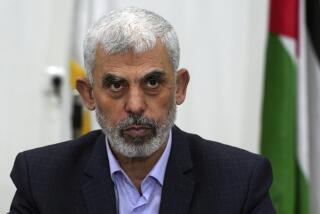Senior militant leader in Afghanistan caught
- Share via
Reporting from Kabul, Afghanistan, and New Delhi — Western forces in Afghanistan said Saturday that they had captured a senior leader of the militant Haqqani network, the group blamed for high-profile attacks that include a recent siege of the U.S. Embassy and NATO headquarters in Kabul.
Haji Mali Khan, the uncle of the group’s leader, Sirajuddin Haqqani, was armed but did not resist when he was detained Tuesday in an operation close to the porous Pakistani border, NATO’s International Security Assistance Force said in a statement. Mali Khan was described as a key strategist for the group.
Word of the seizure was kept quiet for several days, presumably so U.S. and Afghan forces could interrogate him and follow up on any intelligence leads.
He reportedly served as an emissary between the Haqqani group and Baitullah Mehsud, the Pakistani Taliban chief who was killed in a suspected U.S. missile attack in 2009. Mali Khan is accused of establishing and managing bases in Paktia province near the Pakistani border and handling financial and logistical support for various militant operations.
The capture is a “significant milestone in the disruption of the Haqqani network,” the statement said. “Mali Khan moved forces from Pakistan to Afghanistan to conduct terrorist activity” and had “oversight of operations” in both countries. A number of other insurgents, including his deputy, were captured at the same time.
The U.S. is considering adding the Haqqani network to its list of foreign terrorist organizations. The network was founded by Jalaluddin Haqqani, a warlord who made his name — and received funding from the CIA and Pakistan — during the 1980s fighting the Soviets in Afghanistan.
With its links to both the Taliban and Al Qaeda, it has been described as a top Afghan security threat. The group is blamed for hundreds of attacks, including a 19-hour siege of the U.S. Embassy and NATO headquarters last month that left 16 Afghans dead.
Mali Khan’s capture came days after the assassination of former Afghan president and peace negotiator Burhanuddin Rabbani, for which some have blamed the Haqqani network.
Afghan President Hamid Karzai said Friday that in light of Rabbani’s killing he would focus regional security talks on Pakistan rather than on the Taliban.
Pakistan’s links to Islamic militants are under growing U.S. and Afghan scrutiny. The U.S. military has accused Pakistan’s Inter-Services Intelligence agency of assisting the Haqqani network in the U.S. Embassy-NATO headquarters attack, a charge Pakistan has denied.
In an interview Friday, President Obama stopped short of directly linking Pakistan’s government to Haqqani, but said Islamabad has “got to take care of this problem.”
Afghanistan’s main intelligence agency, the National Directorate of Security, said Saturday that it had handed over evidence to Pakistan that planning for Rabbani’s assassination took place in a suburb of the Pakistani city of Quetta.
Many analysts believe that the Taliban leadership, known as the Quetta Shura, uses Quetta as a base. Pakistan has denied any such activity in the city, and the group contends that it operates only in Afghanistan. But having a safe haven across the border would offer many strategic and tactical advantages, analysts said.
“A confession from those we detained in regard to Rabbani’s assassination shows a direct involvement of the Quetta Shura,” Lutfullah Mashal, a spokesman for the Afghan security directorate, said at a news conference. One man who has been arrested played a key role in the Rabbani plot, Mashal said.
He “provided evidence and documents which we have submitted to the Pakistan Embassy,” Mashal said. “Based on mutual cooperation and diplomatic ties with Afghanistan, Pakistan is obliged to take action.”
India also has been pressuring Islamabad to fully investigate and prosecute Pakistan-based militant groups, which India believes planned and directed the attack on Mumbai in November 2008 that killed 166 people.
Though Pakistan has long denied supporting the Haqqani network or other insurgent organizations, analysts said its policy of encouraging, funding and support militant groups dates back decades, conceived to fight India in the disputed area of Kashmir, which both nations have claimed since they became independent in 1947.
North Atlantic Treaty Organization security forces say they have conducted more than 500 operations this year aimed at disrupting the Haqqani network and leadership, killing 20 operatives and capturing nearly 300 insurgent leaders and 1,300 suspected Haqqani insurgents.
“The Haqqani network and its safe havens remain a top priority for Afghan and coalition forces,” the military statement said.
Special correspondent Yaqubi reported from Kabul and Times staff writer Magnier from New Delhi.
More to Read
Sign up for Essential California
The most important California stories and recommendations in your inbox every morning.
You may occasionally receive promotional content from the Los Angeles Times.










